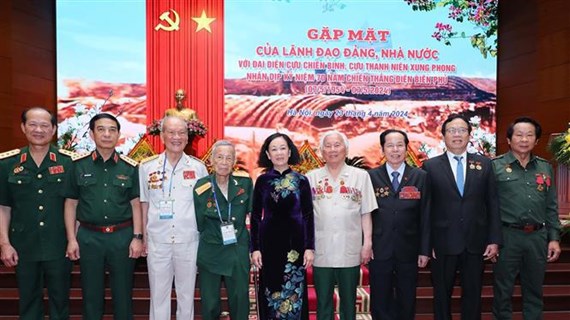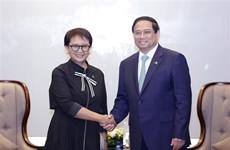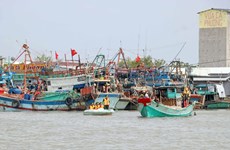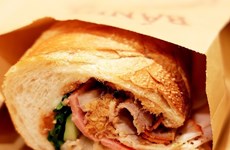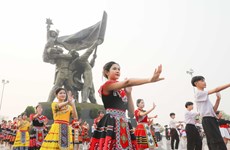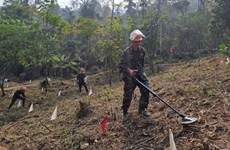Rattan makers to attend WWF fair
Two Vietnamese rattan companies chosen by the World Wide Fund for Nature
(WWF) to attend a design fair in Frankfurt, Germany, were selected for
their sustainable production methods.
Two Vietnamese rattan companies chosen by the World Wide Fund for Nature
(WWF) to attend a design fair in Frankfurt, Germany, were selected for
their sustainable production methods.
"Attending the Ambiente fair created a chance to demonstrate that the Vietnamese rattan industry wants to focus on quality and sustainability," said Le Thai Tinh, sales director of the Vinh Long Joint-Stock company.
Rattan species are members of the palm family. They grow climbing and winding around other vegetation. Some varieties can grow to lengths of more than 100 metres.
"Forests with such a wide variety of flora and fauna, which have disappeared in other regions of the world, still exist in the Mekong region," said Thibault Ledecq, WWF Sustainable Rattan Project Manager.
More than 1,000 new animal and plant species have been discovered in the Mekong region in the last 10 years alone.
Unfortunately, rattan resources are being overexploited, leading to a decline of many rattan species, and causing forest destruction.
Five years ago, WWF set up a programme for sustainable production and processing of rattan in the Mekong region, including Vietnam , Laos and Cambodia , to avoid an adverse impact on tropical forests when the rattan is harvested.
It includes the optimisation of material and energy flows, minimising waste and water contamination, and reducing emissions to the greatest extent possible.
"Sustainable rattan only has a chance if there is a market for it and if the forests where the rattan grows are still standing," explained Ledecq.
The WWF is working with Swedish designers from the University of Lund , in cooperation with local companies, to develop rattan products that are suitable for the international market.
WWF also works with rattan companies to engage with an environmentally friendly production system called CP (Cleaner Production).
"We engage with CP because it helps us reduce production costs by maximising the utility of waste and create better working condition for our workers," said Nguyen Huy Thong, sales manager of Ngoc Dong company.
Vietnam plays an essential role for the EU market, mainly in Germany and France. It is also a major importing country, with suppliers from Laos, India, Cambodia, and the Philippines . /.
"Attending the Ambiente fair created a chance to demonstrate that the Vietnamese rattan industry wants to focus on quality and sustainability," said Le Thai Tinh, sales director of the Vinh Long Joint-Stock company.
Rattan species are members of the palm family. They grow climbing and winding around other vegetation. Some varieties can grow to lengths of more than 100 metres.
"Forests with such a wide variety of flora and fauna, which have disappeared in other regions of the world, still exist in the Mekong region," said Thibault Ledecq, WWF Sustainable Rattan Project Manager.
More than 1,000 new animal and plant species have been discovered in the Mekong region in the last 10 years alone.
Unfortunately, rattan resources are being overexploited, leading to a decline of many rattan species, and causing forest destruction.
Five years ago, WWF set up a programme for sustainable production and processing of rattan in the Mekong region, including Vietnam , Laos and Cambodia , to avoid an adverse impact on tropical forests when the rattan is harvested.
It includes the optimisation of material and energy flows, minimising waste and water contamination, and reducing emissions to the greatest extent possible.
"Sustainable rattan only has a chance if there is a market for it and if the forests where the rattan grows are still standing," explained Ledecq.
The WWF is working with Swedish designers from the University of Lund , in cooperation with local companies, to develop rattan products that are suitable for the international market.
WWF also works with rattan companies to engage with an environmentally friendly production system called CP (Cleaner Production).
"We engage with CP because it helps us reduce production costs by maximising the utility of waste and create better working condition for our workers," said Nguyen Huy Thong, sales manager of Ngoc Dong company.
Vietnam plays an essential role for the EU market, mainly in Germany and France. It is also a major importing country, with suppliers from Laos, India, Cambodia, and the Philippines . /.





